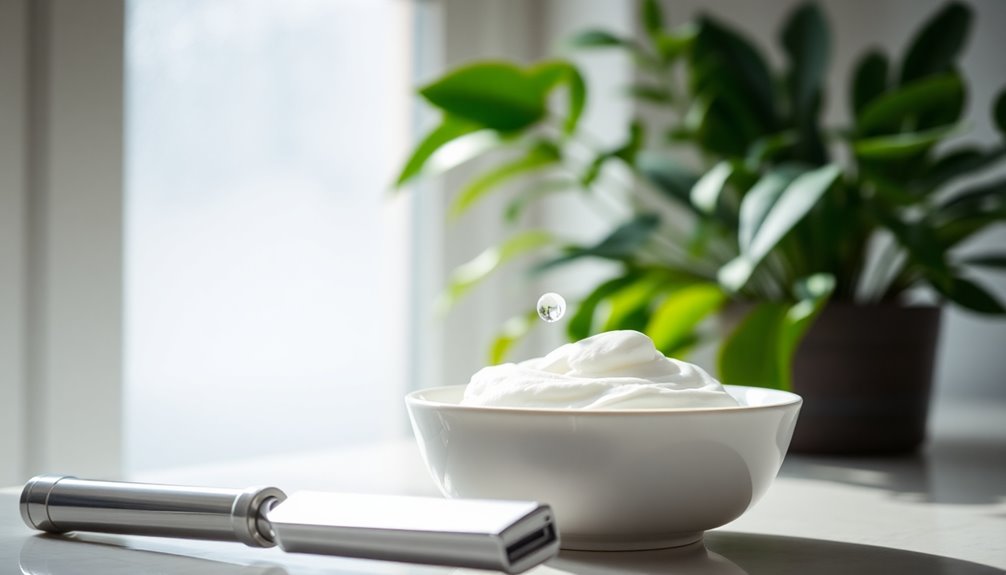Creating a skincare routine that is safe for pregnancy is crucial for the health of both you and your baby. To start off, use a gentle, fragrance-free cleanser to help manage hormonal breakouts. Incorporate hyaluronic acid for hydration and niacinamide to reduce inflammation. Remember to always apply a broad-spectrum sunscreen with at least SPF 30 to protect against pigmentation changes like melasma. Avoid using retinoids and high doses of salicylic acid as they can be risky. Mineral sunscreens, which contain zinc oxide or titanium dioxide, are the safest option for you. Consult your healthcare provider for personalized advice on how to maintain healthy and glowing skin during this special time – there is a lot more to discover!
Key Takeaways
- Use broad-spectrum sunscreen with SPF 30+ daily to protect against sun-induced pigmentation changes like melasma.
- Opt for gentle, fragrance-free cleansers and moisturizers to avoid irritation and support sensitive skin.
- Incorporate pregnancy-safe ingredients like hyaluronic acid, niacinamide, and azelaic acid for hydration and acne management.
- Avoid harmful ingredients such as retinoids, hydroquinone, and high doses of salicylic acid to ensure maternal and fetal safety.
Importance of Safe Skincare
Why is safe skincare important during pregnancy? It's essential because hormonal changes can affect your skin, making careful ingredient choices fundamental for both your health and your baby's development.
During this time, you need to be especially cautious about the ingredients in your skincare products. Certain ingredients you should avoid, like retinoids and hydroquinone, can be absorbed into the bloodstream, posing potential risks.
To maintain skin health during pregnancy, opt for pregnancy-safe skincare products that prioritize gentleness and effectiveness. A gentle cleanser should be your first step, ensuring you're not irritating your sensitive skin.
Additionally, daily sunscreen is a must; a broad-spectrum sunscreen with SPF 30 or higher protects your skin from harmful UV rays and helps prevent conditions like melasma that can worsen with sun exposure.
Consulting with dermatologists and OB/GYNs can provide you with tailored advice on which products are safe to use.
Common Skin Changes

As your body changes during pregnancy, you might notice some common skin issues that pop up.
Hormonal fluctuations can lead to a mix of acne, pigmentation changes, and even new skin growths.
Understanding these shifts will help you adapt your skincare routine effectively.
Hormonal Effects on Skin
Hormonal fluctuations during pregnancy can cause a variety of skin changes, affecting many women in different ways. One common issue is melasma, resulting in dark spots on your face, which affects around 70% of expectant moms.
You might also experience increased oil production, leading to acne during pregnancy, especially in the first trimester. Thankfully, many women notice improvement by the second trimester.
Your skin may become more sensitive, making existing conditions like rosacea worse, which can cause increased redness and spider veins. Additionally, harmless skin growths, such as skin tags and cherry angiomas, may appear, but these typically resolve after childbirth.
You might also notice stretch marks as your skin expands, and while there's no surefire way to prevent them, maintaining hydration can help support your skin barrier and enhance elasticity.
As you navigate these skin concerns, consider incorporating maternity skincare products that cater to your changing needs. By being mindful of these hormonal effects, you can take proactive steps to care for your skin during this exciting time.
Acne and Breakouts
Pregnancy often brings about increased oil production, leading to breakouts, especially around the chin, jawline, and cheeks. These hormonal fluctuations can cause acne to flare up, and you might notice cystic acne becoming more common in your first trimester.
Fortunately, many women experience some improvement in their skin by the second trimester.
To manage pregnancy-related acne safely, focus on using gentle, fragrance-free cleansers and moisturizers that won't irritate your skin. Topical treatments like niacinamide, azelaic acid, and low-dose salicylic acid are generally considered safe during pregnancy and can be effective in controlling breakouts. However, avoid traditional retinoids, as they pose potential risks.
It's crucial to consult with a dermatologist who can tailor a skincare routine specifically for you. They'll help you navigate the best options for your unique needs and guarantee you're using safe products throughout your pregnancy.
Pigmentation Changes During Pregnancy
Pigmentation changes, often called melasma or the 'mask of pregnancy,' can affect up to 70% of you during this transformative time, leading to dark patches on your forehead, cheeks, and upper lip.
These changes occur due to hormonal fluctuations that increase melanin production, especially in pregnant women with darker skin tones. While melasma usually fades after childbirth, it may persist or reappear during breastfeeding due to hormonal shifts.
To effectively manage pigmentation changes, consider these important tips:
- Use pregnancy-safe products: Look for ingredients like vitamin C and azelaic acid, which can help brighten your skin.
- Prioritize sun protection: Wearing a broad-spectrum sunscreen with zinc oxide is vital to prevent melasma from worsening.
- Avoid direct sun exposure: Whenever possible, stay in the shade and wear hats or clothing that cover your skin.
Managing Melasma Effectively

If you're experiencing melasma during pregnancy, it's important to identify your triggers and explore effective treatment options.
Pay close attention to sun exposure, as it can worsen dark patches on your skin.
With the right skincare routine, including protective measures and targeted ingredients, you can manage melasma more effectively.
Identify Triggers of Melasma
Identifying triggers of melasma is essential for effectively managing this common skin condition that many women experience during hormonal changes.
As an expecting mom, understanding what exacerbates melasma can help you maintain a healthy pregnancy skincare routine. Here are some key triggers to be aware of:
- Sun Exposure: UV rays can worsen pigmentation, so wearing broad-spectrum sunscreen with SPF 30 or higher is a must.
- Hormonal Changes: Your body's fluctuating estrogen and progesterone levels can lead to melasma, especially during pregnancy and breastfeeding.
- Skincare Products: Certain ingredients can irritate your skin, so opt for gentle products. Azelaic acid is a pregnancy-safe option that can help reduce pigmentation.
Effective Treatment Options
Managing melasma effectively requires a proactive approach that includes sun protection and the right skincare products tailored for your changing skin during pregnancy.
Start with a broad-spectrum mineral sunscreen containing zinc oxide. This is essential, as UV rays can worsen melasma.
Incorporate pregnancy-safe ingredients like niacinamide and azelaic acid into your skincare routine; these help even out skin tone and reduce pigmentation. Vitamin C is also beneficial for brightening your complexion.
Exfoliation is key for managing melasma. Alpha hydroxy acids (AHAs), such as lactic acid, are generally safe to use during pregnancy. They help slough off dead skin cells, promoting brighter and more even skin.
Regular exfoliation can enhance the effectiveness of other treatments and improve your overall skin texture.
Acne Treatment Strategies

Steering through acne during pregnancy can be challenging, but effective treatment options exist that prioritize your safety and skin health. As your hormones fluctuate, you might notice increased oil production leading to pregnancy acne. Fortunately, some topical acne treatments are safe to use.
Here are some strategies to take into account:
- Niacinamide: This ingredient helps reduce inflammation and redness while improving skin texture.
- Azelaic Acid: Known for its antibacterial properties, it can help clear pores and reduce acne.
- Glycolic Acid: A gentle exfoliant that can aid in unclogging pores without harsh side effects.
Avoid strong retinoids and high-dose salicylic acid, as these pose risks during pregnancy. For over-the-counter options, cleansers and serums with less than 2% salicylic acid can be a gentle way to treat acne without significant risks.
Always consult with a dermatologist for personalized treatment options and to address any severe acne concerns you may face. Prioritizing safety will guarantee both your skin health and your baby's well-being.
Recommended Safe Ingredients

When choosing skincare products during pregnancy, you'll want to focus on safe ingredients that nourish your skin without posing risks to your baby. Look for products containing hyaluronic acid and azelaic acid, as they're safe to use for hydration and redness reduction. These ingredients are gentle but effective, making them perfect for your changing skin.
Alpha hydroxy acids (AHAs), like glycolic and lactic acid, can also be beneficial when used in moderation. They help with exfoliation and pigmentation concerns, guaranteeing your skin stays fresh and vibrant during pregnancy and postpartum. Additionally, opt for fragrance-free products to minimize irritation and support sensitive skin.
Don't forget about sun protection! Mineral sunscreens with zinc oxide or titanium dioxide are essential for shielding your skin from harmful UV rays. They provide a physical barrier without being absorbed into your skin, making them safe to use during pregnancy.
As you explore your skincare options, always check product labels for pregnancy-safe certifications to verify you're making the best choices for both you and your baby.
Products to Avoid

During pregnancy, it's vital to avoid certain skincare products that can harm both you and your developing baby. Being mindful of the ingredients in your skincare routine is important for maintaining pregnancy-safe skincare.
Here are some products to avoid:
- Retinoids: All forms, including tretinoin and retinol, can cause birth defects, so steer clear of these.
- Hydroquinone: This skin-lightening ingredient is unsafe due to high absorption rates, posing risks to fetal development.
- High Doses of Salicylic Acid: While low doses in over-the-counter products may be considered safe during pregnancy, high doses should be avoided.
Instead of these products, focus on pregnancy-safe skincare options that prioritize your health and that of your baby.
Always consult your healthcare provider before introducing new products to your routine, ensuring you make informed choices that are safe during pregnancy.
Can Expecting Moms Use Teen Skincare Products for Their Pregnancy Safe Skincare Routine?
Are teen skincare tips for young skin safe for expecting moms to use in their pregnancy safe skincare routine? It’s best to consult with a dermatologist before using any new products during pregnancy to ensure they are safe for both mom and baby.
Conclusion
In your journey through pregnancy, prioritizing safe skincare is essential for both you and your baby.
Embrace the changes your skin undergoes, and remember that managing melasma and acne is possible with the right products.
By choosing safe ingredients and avoiding harmful products, you can nurture your skin without worry.
After all, healthy skin is a reflection of the love and care you give yourself during this special time.
Trust your instincts, and enjoy this beautiful phase of life!









